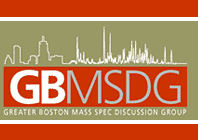GBMSDG Meeting Archives
January 19, 2011
Guest Speaker
Forest White, Ph.D.
Massachusetts Institute of Technology
Cambridge, MA
Biological Insights from Quantitative Analysis of Cellular Signaling Networks
Location
Novartis Institutes for Biomedical Research (NIBR)
250 Massachusetts Avenue
Cambridge, MA
Sponsored by
Novartis Institutes for Biomedical Research
Special thanks to Novartis Institute for Biomdical Research for sponsoring and hostong this event. It is the active participation of our sponsors that allows us to keep the fees for membership, dinners, drinks, speakers, etc. so low.
Presentation Abstract
To effectively monitor protein phosphorylation events governing signaling cascades, we have developed a mass spectrometry-based methodology enabling the simultaneous quantification of tyrosine phosphorylation of specific residues on dozens of key proteins at multiple time points under a variety of perturbations. We have recently applied this technique to identify key signaling nodes regulating EGFR, Insulin Receptor, and T Cell Receptor signaling network response to stimulation.
Here we have performed an in-depth characterization of the network-wide effects of single-point mutations on the oncogenic, constitutively active, EGFRvIII receptor tyrosine kinase. This study quantifies the adaptive capacity of cellular signaling networks and the pleiotropic effects of knocking out individual phosphorylation sites with the network. Computational analysis of the phosphorylation data relative to phenotypic data highlights the role of selected protein phosphorylation sites in regulating biological outcome. We demonstrate the utility of a data-driven computational model that is capable of fully describing glioblastoma cell growth based on just 13 phosphoproteins. Overall, we have now demonstrated that the combination of mass spectrometry-based analysis of protein phosphorylation with phenotypic measurements and computational modeling yields novel insights into the regulation of cellular signaling on a network scale.